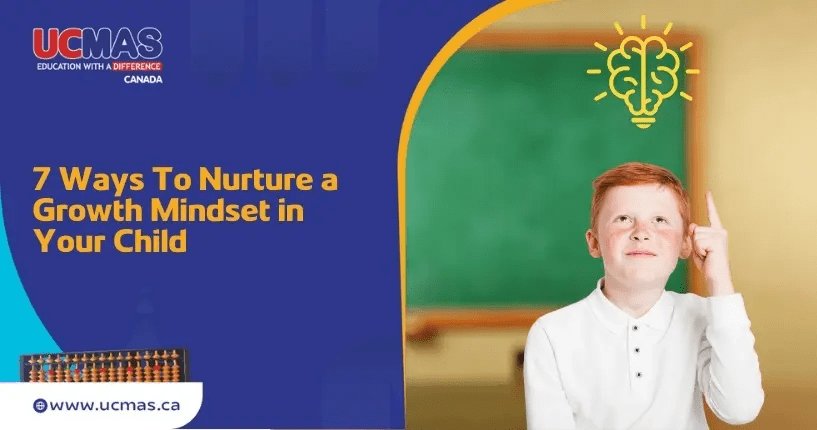
We have all heard about the growth mindset multiple times and why having this mindset can be game-changing. While we understand its benefits, the real question is: How can we cultivate this mindset, especially in young children? Are there any activities that can be proven to develop a child’s growth mindset? Well, there are and in this blog, we will reveal 7 such activities that can help elementary school kids develop a growth mindset.
But before that, let us understand what a growth mindset really is:
What is a Growth Mindset?

Simply put, a growth mindset is nothing but having a belief that almost all skills can be developed if you put in the dedicated efforts that are backed by tangible actions. People with a growth mindset believe that intelligence and talent are not just inherent traits, but they can be improved over time.
But why should one work on cultivating their child’s growth mindset? Well, like all other good habits in life, the earlier our kids develop this mindset the better. Inculcating a positive attitude and growth mindset in a child, help them see obstacles as opportunities for growth. Children with a growth mindset do not get disheartened by petty failures, instead, they stay motivated, work harder, and keep trying until they succeed.
If that sounds like a skill you would want your child to develop, then read on as we discuss some fun and engaging activities for elementary school kids to help them develop a growth mindset.
Plant the Seeds of Success With These 7 Growth Mindset Activities
Given below are some simple yet effective ways that can empower children to embrace setbacks, persevere through difficulties, and ultimately achieve their full potential.
#1 Teach them to flip their flop:
Teach your child to flip all their negative thoughts and words into positives. So, when they say “I can’t solve this math problem” you can make them say “I can’t solve this math problem yet”. Adding this one simple word can make their negative statement into a positive, solution-oriented statement. By incorporating this simple technique into your child’s daily life, you will help them build resilience and perseverance.
#2 Brainstorming sessions:

When children participate in brainstorming sessions they learn to think creatively and discover innovative ideas. When they share these ideas with their peers, they also develop other important skills like confidence, self-esteem, risk-taking and experimentation abilities, and communication. All these skills can help a child develop a growth mindset and a problem-solving attitude.
#3 Writing self-affirming statements:
Parents can teach their children to write self-affirming statements or positive affirmations to boost their self-esteem. Writing, repeating, and believing these affirmations will help them trust their abilities and they start approaching challenges with a can-do attitude. When your child writes statements like “I am a good learner,” “I can take up difficult challenges,” “I am smart and capable” or “I am a problem-solver,” they not only start believing in their capabilities but also stay motivated and work hard towards their goals.
#4 Mental math puzzles:
Mental math puzzles are a fantastic tool for nurturing a child’s growth mindset. These puzzles challenge children to think critically and solve problems. Provide your child with math worksheets, and help them connect their math problems with real-world scenarios or help them break down math problems into smaller, more manageable steps. This helps them develop crucial life skills like problem-solving and decision-making. Read this blog by UCMAS to understand how mental math can benefit your child.
#5 Growth mindset games:

Did you know that every board game you play with your child can be a great example of a growth mindset game? In these games, players experience both wins and losses, but the only path to success is to keep trying. You can also play an escape room activity with your child. This game motivates them to discover new ideas and work together to solve problems. Some escape room exercises are specifically curated to help children build and enhance a growth mindset.
#6 Setting SMART goals and reflection:
Teach your child to set specific goals so they can measure their progress. Guide them in creating goals that are specific, measurable, achievable, relevant, and time-bound (SMART). Encourage them to break down these goals into smaller, manageable steps and track their progress. Reflecting upon their goals will motivate and persuade them to work harder.
#7 Enrolling kids in Abacus classes:
Enrolling your child in an Abacus math afterschool program can help them build resilience, confidence, and problem-solving skills. When your child starts practicing math and solving complex problems, their confidence grows. Abacus can introduce kids to various problem-solving techniques, thus encouraging their creativity and critical thinking abilities. Altogether, these elements empower children to believe in their ability to learn, adapt, and overcome challenges.
How Can UCMAS Abacus Mental Math Program Help Develop Your Child’s Growth Mindset

Our mental math program uses tools like Abacus and strategies like visualization to help develop both the logical and creative side of your child’s brain. Our afterschool program uses a host of cognitive skill development strategies like speed writing, flashcards, listening exercises, etc to improve your child’s memory, visualization, attention, and motor skills.
UCMAS Abacus classes are designed to enhance your child’s confidence. Our math worksheets develop your child’s arithmetic skills allowing them to perform well in their classrooms. These activities also help them handle other life situations with a positive attitude.
So, what are you waiting for? Look for a UCMAS centre in Canada near you and enroll your child now.






